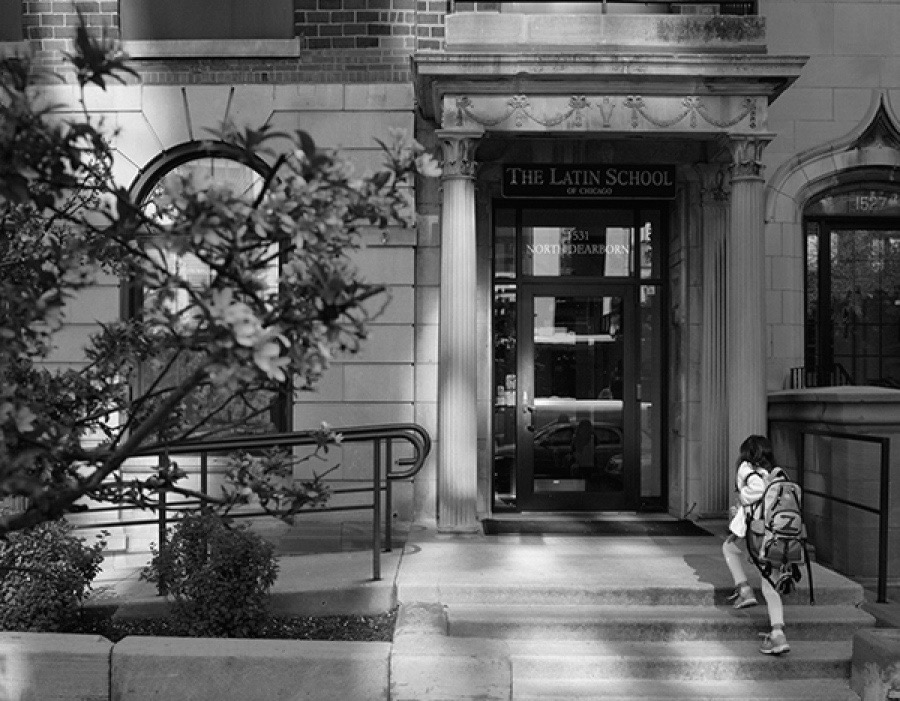Jobs and schools should be places where you do not dread to go. Granted, there will be times of panic and fear (Test! What test? I didn’t see that on Romannet.), but in general, we should all believe that our colleagues are not out to get us. The basic belief that we should not have to work in a hostile environment should be clear to everyone. But what makes for a hostile environment, and what is the relationship of that to freedom of speech and opinion? How do we create a school that does both? To give us distance to understand both the question and a possible answer, I am going to do something that goes with my discipline; I am going to look to the past. For the purpose of this essay, put yourself in the position of a Jewish boy attending the Latin School for Boys in, say, 1924. Assuming that Latin was like the rest of the elite private school world of the 1920s, 30s and 40s, and that you were a student of the “Hebraic persuasion,” the first thing that you would know is anti-Semitism. It was in the water that you drank and the air that you breathed. You would know that there was religious prejudice, as there had been for thousands of years, and that kids might mumble “Christ killer” under their breaths as you walked through the halls. You might know that at Easter service your classmates listened to their priests or ministers preach that Jews were damned for all time. So, sometimes when you got into a heated discussion with one of them, they might respond with a line like, ”What do you know, you’re going to hell anyhow.” They might even say that they respected you, but it is what their religion teaches, and that they have the freedom of religion to say it, and anyhow, that is just the way it is. If a teacher heard it, his response would probably be something like, “I know that might hurt, but it is the Gospel, and we cannot change God’s Law.” He wouldn’t know that the Roman Catholic Church would do just that in 1963. The proclamation that came from the Vatican II Conference was that it was not the Jews alone who were responsible for Christ’s murder; it was all mankind. But as a schoolboy in the 1920s, you would have to put up with the constant reminder that you were inferior. Right after the Holocaust it started to be considered impolite to say those things about Jews. Today, we would say that those lines were politically incorrect, but your grandparents would simply say that we don’t use those words in polite company. But you would have friends who were Christian, and they might be slurred too. Those slights weren’t against your friends, whose parents or grandparents had converted to Christianity, due to religious prejudice; they happened because those Christians were considered racially Jewish. Anti-Jewish prejudice is old, but racial anti-Semitism is new. It can be traced to an essay published in the 1870s by Wilhelm Marr. The new anti-Semitism says that Jews are a mongrel race, and that the “Semitic race” is the result of the inbreeding of Asiatic Semites with Aryan Greeks in Judea during ancient times. These racial Semites had Aryan traits but could not govern themselves nor could they create valid new ideas; they could only copy ideas and, worse yet, could only develop crazy, dangerous, and evil ideas, such as Marxism and finance capitalism. They were biologically prone to make the world a bad place. The Jews were out to take over the world and destroy it. You might not know about Marr, but you would be aware of these ideas because they were all in a book that was quite popular with the kids in school. The book was the Protocols of the Elders of Zion, and it was all the rage because Henry Ford was publishing it and sending it out to schools for free. If you lived in Germany instead of Chicago, both you and your Christian friend would have found yourselves in death camps in the 1940s. Jews were racially inferior and dangerous. It’s the reason that the Nazis murdered infants; Jewish infants could not be saved because they had Jew genes. Because race is nothing more than a social construction (something that exists simply because we all believe it exists), Jews are considered white today, but they weren’t white a hundred years ago. And two hundred years ago, even Irish people weren’t white. In addition, you wouldn’t hear just Christ killer or commie-financier. You would also have to put up with other little digs and slights. You might go with a Christian friend to the store and hear him try to “Jew someone down.” The expression meant that Jews were cheaters and that they only have money because they stole it by unscrupulous banking practices or manipulating the market. You might have had a friend tell you that you cannot come to his skating party because his club is restricted. Since you couldn’t go to his club, perhaps your family joined one of the Jewish clubs, and now all your friends are the guys who hang out at the Standard or Covenant Club with you. So now you hear the other “white” guys talking about how clannish the “Hebs” or “Yids” are and that you only sit with each other in the cafeteria. You also wouldn’t live in the school’s neighborhood because the buildings around there were all restricted so purchase or rental was limited to white Christians. So you would hear about how you thought yourself “too good to spend time with us.” These little slights are what we might call micro-aggressions today, but in the past they were called slights. I prefer the term slights because it is simpler and clearer, but understand what a micro-aggression means. In biology class you might have been required to read Charles Davenport’s Heredity in Relation to Eugenics, in which Jews were people with “intense individualism and ideals of gain at the cost of any interest” were a threat to the “health” of Anglo-Saxon Germanic America. You would have also learned that we need a good immigration bill to keep out not only people like you but also all of those lesser races from Southeastern Europe that threatened to destroy America. Allowing racially inferior Italians, Poles, Russians, etc., to immigrate freely in the United States threatened to make America more “given to crimes of larceny, kidnapping, assault, murder, rape and sex-immorality…” In order to make America great again, Davenport and others argued that we needed to build a wall to keep out those threats. The wall they built was the Immigration Act of 1924 that contained quotas to keep people like you out. It did its job and because of it, hundreds of thousands, perhaps a million, Jews could not escape the Holocaust and come to America. But nobody understood that in 1924; they just knew that there were “rapists” sneaking into America with intent to take away peoples’ jobs and destroy the moral foundation of white America. As a Jewish kid, you would have overheard people talking about how the act didn’t go far enough. You would have heard them say, “We need a law that sends them all back,” and you would have known that they meant you. Perhaps you have heard someone say something similar about one of your friends this week. So this is what they would have said about you as a Jewish kid, or a Polish kid, or an Italian kid. Italians were all Mafia criminals. All Poles were stupid and uncultured and were called white n—–s. Therefore, I get really angry when I hear a Jewish kid joking about building a wall to “keep those people out.” Less than a hundred years ago, that joker would have been the person that they wanted to keep out. When I hear a kid with an Italian background saying that “those people really are more violent,” it reminds me of the time when that was what they said about Italians. (They’re all Mafia you know. Look at the people shooting each other on the streets of Chicago; they are all Italians like Al Capone and Frank Nitti.) If school is going to be a safe place, we have to stop making these generalizations and accepting myths about other people. However, that doesn’t mean that there is no place for a wide variety of political opinions. If we are to use the past to understand the future, then it is my obligation to make the connections clear. We are a school that prides itself on academic excellence, teaching the whole child. We believe in “not doing unto others, as we would not have others do unto us.” Academic excellence, in this context, means that I must be willing to discuss and debate any number of opinions that are logically tenable. If you say to me, as some of you have, that, “My religion dictates that people have the right to deny service to homosexuals,” I will grant you that your position is legitimate. However, if I grant you the right to hold your position, you must grant me the right to have a law that bans you from eating a rare, bacon cheeseburger since that entrée breaks at least four laws found in Leviticus. More importantly, I will warn you that you are opening the door to anyone else who has a strongly held belief that you might not like. Think about the banker who has the strongly held belief that meat is murder and refuses to give loans to farms and groceries that sell meat, or even to meat eaters. We can have this discussion, and if you come away still believing that laws like those in North Carolina are good, then I cannot tell you are wrong to believe it. However, if you want include pseudo-science in the curriculum, I will tell you that you are wrong and that these ideas are illegitimate. Creationism, in any form, does not belong in science. It is not legitimate. Racism in any form is not legitimate. The range of different opinions that are valid in Middle East history is gigantic, but there are some ideas that go beyond the pale. It is acceptable to believe that the United States has a moral obligation to take out ISIS and to oppose Iran, but it is not valid to state that we should carpet bomb the whole region and “turn the desert into glass.” The idea that we should be able to murder all the men, women and children in the region is abhorrent to our values. Concepts like this should be beyond the pale of civilized discussion in the classroom. It is legitimate to discuss the idea that Israel is a racist, settler colony, but it is not valid to believe that the Holocaust should not concern us because it was just white people killing other white people. We also cannot tender HAMAS’ belief that the Jews are a criminal conspiracy intending to take over the world – a belief that they got from old Nazi propaganda. We can talk about ideas. We can debate ideas. We can and should look at the world from multiple perspectives. What we cannot do is allow slogans and false statistics and downright lies to dominate the conversation. No groups of individuals, regardless of their political stripes, should feel silenced in this community. There is, however, a distinction between legitimate and illegitimate discourse. If we are talking about ideas and not about slogans, we are in good shape. If we are debating actual costs and benefits of various solutions to our problems, we are doing what a school should do. ]]>






































lmccutch • Jun 7, 2016 at 7:49 am
Nice job!!!